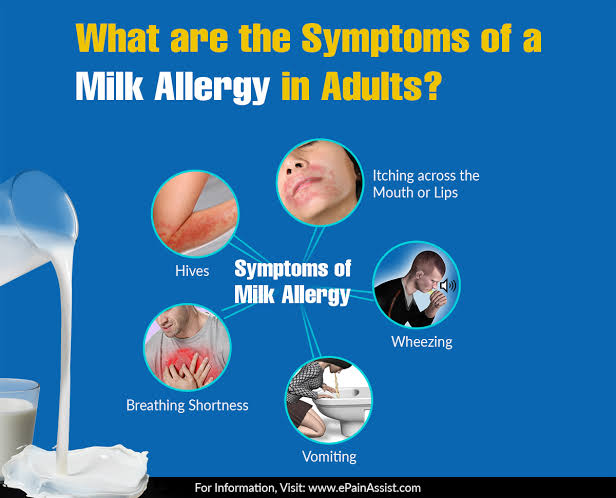
Milk contains water, proteins, minerals, fats and carbohydrates (lactose is the milk sugar). Those who are allergic to milk have an allergic reaction to the proteins in cow’s milk.
Although it’s more common in infants and children, adults can develop a milk allergy in their 30s and 40s, according to Allergy Escape, and the symptoms a milk allergy causes can affect the skin, digestive and respiratory systems.
Symptoms of milk allergy in adults
rash
Milk allergy symptoms can occur within minutes of consuming a milk-containing product, and a rash often appears on the skin around the mouth first and then occurs all over the body.
The rash appears red and hives-like, or it may be just patches of dry, red skin similar to eczema.
Intestinal discomfort or stomach pain
Many people often confuse milk allergy with lactose intolerance, and although both conditions can cause gastrointestinal discomfort, lactose intolerance is considered a digestive problem, while milk allergy is an immune response.
For those who are allergic to milk, their body sees milk proteins as invaders or enemies, white blood cells attack them and produce antibodies against them, and the body releases chemicals called histamines, which cause allergy symptoms.
Milk allergy causes intestinal pain and abdominal bloating, and nausea and vomiting may also occur.
trouble breathing
For those with a milk allergy, when milk proteins are ingested, the body’s immune system responds, and this causes inflammation in the sinuses. The inflammation leads to an overproduction of mucus, leading to the common symptoms of a stuffy and runny nose.
Inflammation of the trachea and bronchi (the tubes that lead to the lungs) can obstruct airflow and create difficulty breathing. Symptoms can include wheezing, coughing and asthma.
Anaphylactic shock or severe allergic reaction
It is a serious allergic reaction that can be life threatening, and although anaphylactic shock occurs rarely in milk allergy, it can happen.
And when the body’s immune system attacks the milk proteins, a large amount of chemicals that are released into the body can lead to shock.
Symptoms include a sudden drop in blood pressure, airway narrowing, a weak, rapid pulse, skin rash, nausea, and vomiting.
Because milk is found in so many different foods, it is often difficult to determine whether it contains milk proteins. If you are allergic to milk, your doctor may advise you to always carry a medication containing epinephrine to combat the symptoms of anaphylaxis, with the need to go to a hospital when The occurrence of hypersensitivity.






